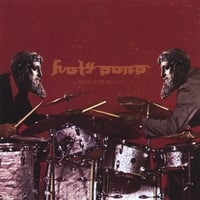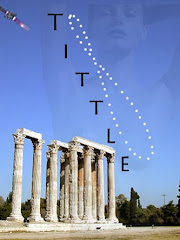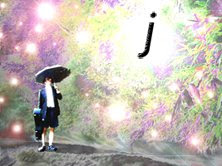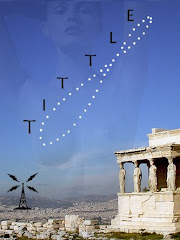Spark of Life (feat. Little j)
Tittle8:
Add Me!
FEEDJIT
Monday, May 18, 2009
Tuesday, April 28, 2009
Fit the First and Further

This show features the original BBC radio series: Hitch Hiker's Guide to the Galaxy - Fit the First. Enjoy H2G2 and great tunes from great musicians the world over!
Tittle8 Radio - Fit the First.mp3
Sunday, April 5, 2009
Western Civilization's Decline Pt. 1
featuring:
John Galt's radio takeover from Ayn Rand's novel, Atlas Shrugged
and
Portland, Oregon's Holy Sons

Labels:
Atlas Shrugged,
Ayn Rand,
Decline,
Holy Sons,
Radio,
Radio23,
Tittle8,
Western Civilization
Friday, March 27, 2009
T i t t l e 8

[ T I T T L E ]
Main Entry: tit·tle
Pronunciation:
\ˈti-təl\
Function:
noun
Etymology:
Middle English titel, from Medieval Latin titulus, from Latin, title
Date:
14th century
1 : a point or small sign used as a diacritical mark in writing or printing2 : a very small part
- Merriam-Webster
The tittle first appeared in Latin manuscripts in the 11th century, to distinguish the letter i from strokes of nearby letters. Although originally a larger mark, it was reduced to a dot when Roman-style typefaces were introduced.
This word is rarely used. Its most prominent occurrence is in the introduction to the Antithesis of the Law in the Gospel of Matthew (5:18): "For assuredly, I say to you, till heaven and earth pass away, one jot or one tittle will by no means pass from the law till all is fulfilled" (NKJV). The quotation uses them as an example of extremely minor details. The phrase "jot and tittle" indicates that every small detail has received attention.
- Wikipedia
[ 8 ]
Main Entry:
eight
Pronunciation:
\ˈāt\
Function:
noun
Etymology:
Middle English eighte, from eighte, adjective, from Old English eahta; akin to Old High German ahto eight, Latin octo, Greek oktō
Date:
before 12th century
1 — see number table
2: the eighth in a set or series
— eight adjective
— eight pronoun, plural in construction
- Merriam-Webster
8 is a composite number, its proper divisors being 1, 2, and 4. It is twice 4 or four times 2. Eight is a power of two, being 23 (two cubed), and is the first number of the form p3. It has an aliquot sum of 7 in the 4 member aliquot sequence (8,7,1,0) being the first member of 7-aliquot tree. It is symbolized by the Arabic numeral (figure) 8.
The number 8 is a Fibonacci number, being 3 plus 5. The next Fibonacci number is 13. 8 is the only Fibonacci number that is a perfect cube.
In the beginning, various groups in India wrote eight more or less in one stroke as a curve that looks like an uppercase H with the bottom half of the left line and the upper half of the right line removed. At one point this glyph came close to looking like our modern five. With the western Ghubar Arabs, the similarity of the glyph to five was banished by connecting the beginning and the end of stroke together, and it was only a matter of the Europeans rounding the glyph that led to our modern eight.
In nuclear physics, the second magic number.
As of 2006, in our solar system, eight of the bodies orbiting the Sun are considered to be planets.
The atomic number of oxygen.
The maximum number of electrons that can occupy a valence shell.
Timothy Leary identified a hierarchy of eight levels of consciousness.
In human adult dentition there are eight teeth in each quadrant. The eighth tooth is the so-called wisdom tooth.
There are eight cervical nerves on each side in man and most mammals.
The Dharmachakra, a Buddhist symbol, has eight spokes. The Buddha's principal teaching -- the Four Noble Truths -- ramifies as the Noble Eightfold Path. In Mahayana Buddhism, the branches of the Eightfold Path are embodied by the Eight Great Bodhisattvas (Manjushri,Vajrapani, Avalokiteshvara, Maitreya, Kshitigarbha, Nivaranavishkambhi, Akashagarbha, and Samantabhadra). These are later (controversially) associated with the Eight Consciousnesses according to the Yogachara school of thought: consciousness in the five senses, thought-consciousness, self-consciousness and unconsciousness-'consciousness' (alaya-vijñana). The 'irreversible' state of enlightenment, at which point a Bodhisattva goes on 'autopilot', is the Eight Ground or bhūmi. In general, 'eight' seems to be an auspicious number for Buddhists, e.g., the 'eight auspicious symbols' (the jewel-encrusted parasol; the goldfish (always shown as a pair, e.g., the glyph of Pisces); the self-replenishing amphora; the white kamala lotus-flower; the white conch; the eternal (Celtic-style, infinitely looping) knot; the banner of imperial victory; the eight-spoked wheel that guides the ship of state, or that symbolizes the Buddha's teaching). Similarly,Buddha's birthday falls on the 8th day of the 4th month of the Chinese calendar.
The Jewish religious rite of brit milah (commonly known as circumcision) is held on a baby boy's eighth day of life
Hanukkah is an eight-day Jewish holiday that starts on the 25th day of Kislev
Shemini Atzeret (Hebrew: "Eighth Day of Assembly") is a one-day Jewish holiday immediately following the seven-day holiday of Sukkot
Members of The Church of Jesus Christ of Latter-day Saints believe that humans are responsible for their actions by the age of 8. Before that age, children lack sufficient knowledge to commit sin and are therefore exempt from judgment for their actions.
In Christianity, it is allegoric to:
what is beyond time (because the number 7 refers to the days of the week which repeat themselves),
and is the number of Beatitudes.
In Islam, It is the number of Angels carrying The Holy Throne of Allah in heavens.
The Eight Immortals are Chinese deities
In Neopaganism, there are eight Sabbats, festivals, seasons, or spokes in the Wheel of the Year.
In Hinduism it's the number of wealth, abundance. The Goddess Lakshmi has eightfold forms. There are eight nidhis - seats of wealth. Also, there are eight Guardians of the directions.
Eight (八; accounting 捌; pinyin bā) is considered a lucky number in Chinese culture because it sounds like the word "prosper" or "wealth" (發(T) 发(S); Pinyin: fā). China took advantage of this by beginning the opening ceremony of the Summer Olympics in Beijing at 8 seconds and 8 minutes past 8 pm (local time) on August 8, 2008.
Eight (八 hachi, ya) is also considered a lucky number in Japanese culture, but the reason is different from that in Chinese culture. Eight gives an idea of growing prosperous, because the letter (八) broadens gradually.
In numerology, 8 is the number of building, and in some theories, also the number of destruction.
In the middle ages, 8 was the number of "unmoving" stars in the sky, and symbolized the perfectioning of incoming planetary energy
An octave, the interval between two notes with the same letter name (where one has double the frequency of the other), is so called because there are eight notes between the two on a standard major or minor diatonic scale, including the notes themselves and without chromatic deviation. The ecclesiastical modes are ascending diatonic musical scales of eight notes or tones comprising an octave.
In chess, each side has eight pawns and the board is made of 64 squares arranged in an eight by eight lattice. The eight queens puzzle is a challenge to arrange eight queens on the board so that none can capture any of the others.
A byte is eight bits
In liquid measurement (US customary units), there are eight fluid ounces in a cup, eight pints in a gallon and eight tablespoonfuls in a gill.
There are eight furlongs in a mile.
An "eighth" is a common measurement of marijuana, meaning an eighth of an ounce. It is also a common unit of sale for psilocybin mushrooms. Also, an eighth of an ounce of cocaine is commonly referred to as an "8-ball."
In China, '8' is used in chat speak as a term for parting. This is due to the closeness in pronunciation of '8' (bā) and the English word 'bye'.
A stop sign has eight sides.
In mythology, the horse of the Norse god Odin Has Eight Legs and is called Sleipnir.
- Wikipedia
Subscribe to:
Posts (Atom)
Apture
Labels
- 42 (1)
- 8 (1)
- Atlas Shrugged (1)
- Ayn Rand (1)
- Creative Deconstruction (1)
- Decline (1)
- eight (1)
- Escape Plans Unlimited (1)
- Eugene (1)
- fit the first (1)
- Garrett Daun (1)
- hitch hiker's guide to the galaxy (1)
- Holy Sons (1)
- Oregon (1)
- Podcast (1)
- Radio (1)
- Radio23 (1)
- tittle (1)
- Tittle8 (3)
- Tittle8 Radio (2)
- UnDoing (1)
- Western Civilization (1)









